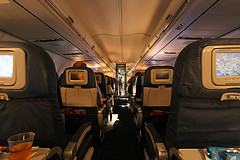All Those Add-On Services Airlines Offer Make It Harder To Shop For The Lowest Fare
Times used to be, you could shop online for the lowest airline fare with a few clicks of the mouse on any number of ticketing sites. But now the companies that supply information about flights and fares are complaining that airlines are refusing to cough up a complete picture when it comes to fees. That makes it tougher for consumers to find the best deal when all is said and done, so the government is looking into things.
Early boarding, extra leg room, baggage fees and other services muck things up and make it harder for global distribution systems to provide handy services to consumers, say those in the industry. And since travel agents and ticketing sites like Orbitz and Expedia account for almost half of all ticket sales, that could be troubling news.
“What other industry can you think of where a person buying a product doesn’t know how much it’s going to cost even after he’s done at the checkout counter?” the chairman of the Travel Technology Association, which represents the global distribution services and online travel industries, tells the Associated Press.
If you can’t compare total fares as easily, you could end up paying a higher price when all is said and done, depending on which add-on services you walk away with. The Department of Transportation is looking at whether or not it should require airlines to hand over that fee information to any entities that sell their tickets.
It was supposed to decide next month, but after airlines against the idea and consumer groups and the travel industry who are all for it swamped regulators with information, that decision won’t happen until May.
Some airlines still aren’t happy with the rule the DOT instituted early in 2012 that requires them to include taxes in total advertised fares. Spirit Airlines, Allegiant Air and Southwest Airlines have gone to the Supreme Court to ask it to reverse an appeals court ruling that upheld the rule. Airlines insist they just want to sell customers tickets and services based on individual customer preferences.
“Technology is changing rapidly. We are going to be part of the change,” said Sharon Pinkerton, vice president of Airlines for America, which represents most U.S. carriers. “We want to be able to offer our customers a product that’s useful to them, that’s customized to meet their needs, and we don’t think (the Transportation Department) needs to step in.”
But those tailored packages would require passengers to provide information like age, travel history, marital status and more — all of which is the kind of info that consumers probably wouldn’t want distributed willy-nilly. Then instead of being able to just shop for the lowest price, opponents of such data mining say airlines will only offer up packages aimed at specific consumers.
“It’s like going to a supermarket where before you get the price, they ask you to swipe your driver’s license that shows them you live in a rich zip code, you drive a BMW, et cetera,” one consumer advocate explains. “All this personal information on you is going out to all these carriers with no controls over what they do with it, who sees it and so on.”
Fees undermine fliers’ ability to compare fares [Associated Press]
Want more consumer news? Visit our parent organization, Consumer Reports, for the latest on scams, recalls, and other consumer issues.


